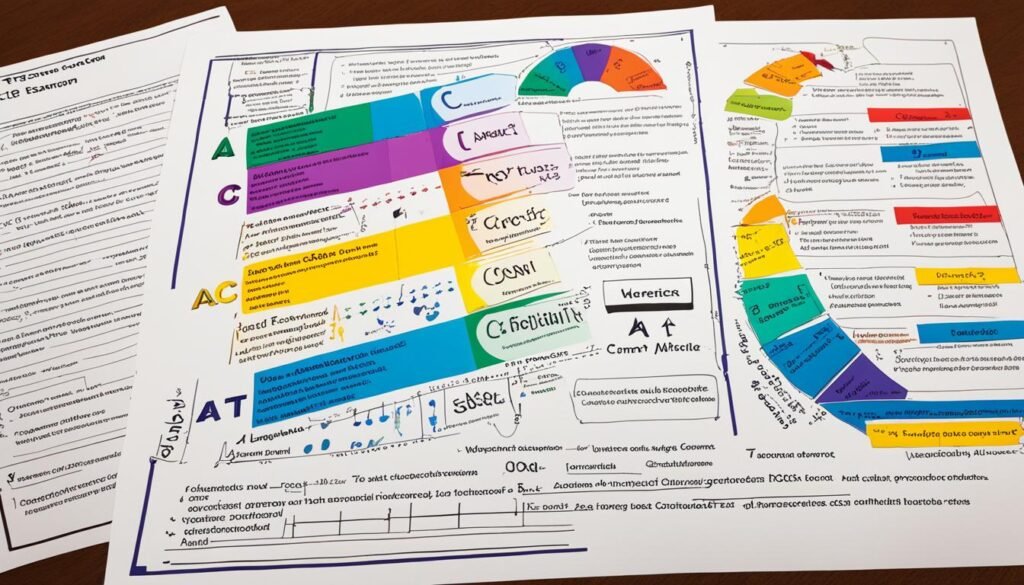Preparing for the ACT exam is key for high school students wanting to prove their college readiness. The ACT tests students on their English, math, reading, and science skills. It gives a deep look into their ability at a college level. With good study habits, students can boost their score, giving them an edge in college applications.
Also Read: What Are Effective Study Strategies For The DAT Exam?
To get ready for the ACT, students should tackle tough courses in high school. These courses hone skills like critical thinking and problem-solving which are crucial for the exam. Also, taking practice tests is a smart move. It helps students get used to the test’s structure, question types, and find their strong and weak points.
Setting aside regular time for study and keeping a positive mind are crucial too. A fixed schedule for reviewing content and practicing for the ACT makes a big difference. It helps students get better and avoid stress on test day. A positive mindset can also reduce testing jitters and improve performance.
Using ACT prep materials is the final step to prepare. Practice tests, study guides, and interactive tools can be a big help. They provide focused practice, detailed answers, and personal advice. This way, students can target their weaknesses and turn them into strengths.
Key Takeaways:
- Take challenging high school courses to develop critical thinking and problem-solving skills
- Practice taking ACT practice tests to familiarize yourself with the format and question types
- Dedicate consistent study time and maintain a positive, focused mindset to boost performance
- Utilize ACT test prep materials, such as practice tests and study guides, to identify and address areas of weakness
- Develop effective time management and test-taking strategies to maximize your ACT score
Understanding the ACT Exam Structure
The ACT Exam tests how well high school students are prepared for college. It includes four main parts: English, math, reading, and science. There’s also a choice to add a writing test for those wanting to show their writing skills.
Also Read: Understanding The Format And Structure Of The MCAT Exam
Overview of the Test Format
The ACT Exam is made up of multiple choice questions. Each part has between four or five answer options. Your score ranges from 1 to 36, based on your performance across all sections.
Sections and Time Allotment
The ACT Exam has the following layout:
- English: 45 minutes, 75 questions
- Math: 60 minutes, 60 questions
- Reading: 35 minutes, 40 questions
- Science: 35 minutes, 40 questions
- Optional Writing: 40 minutes, 1 essay prompt
Scoring and Composite Score Calculation
You can score between 1 and 36 on the ACT Exam. The average of your scores in the four main sections is your composite score. It shows how ready you are for college. The writing test has a separate score and doesn’t affect your composite score.
Knowing how the ACT Exam is set up helps you make a good study plan. It also lets you use the right strategies to do well. Doing your best can show colleges you’re ready for their programs.
Also Read: Best Resources For GRE Exam Preparation
Developing a Solid Study Plan
Getting ready for the ACT Exam takes a plan that’s both smart and steady. Start by figuring out what you want to achieve and aim for a score that falls in the middle 50% of the colleges you’re eyeing. This helps you set your sights and track how you’re doing.
Setting Realistic Goals and Target Scores
Look at your current ACT score and see what score you need for your dreams. Find out the typical ACT scores for the colleges you like and set your goal there. Make sure your goals are high but reachable, considering your skills and study time.
Creating a Consistent Study Schedule
Having a regular study plan is key to getting better at the ACT. Make time to review what you know, work on practice questions, and improve your test strategies. Stick to a plan that you can keep up with as you prepare.
Mastering the Content Areas

The measures your knowledge and skills in English, Math, Reading, and Science. Knowing what each part covers helps you get ready and do better in the test.
Also Read: What Is The LSAT Exam And Why Is It Important?
English: Grammar, Mechanics, and Rhetoric
The English section checks your grasp of grammar, punctuation, and sentence structure. It also sees if you can make writing more effective. To ace this part, study grammar, practice spotting mistakes, and learn how to improve text.
Math: Algebra, Geometry, and Trigonometry
The Math section includes algebra, geometry, and trigonometry. You’ll need to show how you solve problems and use math in real life. Preparing well and practicing problems can really help your score.
Reading: Comprehension and Analysis
In the Reading section, you’ll handle passages that test your understanding and thinking skills. It checks your ability to figure out main ideas and make conclusions. Learning how to read actively and think critically can raise your score here.
Science: Scientific Reasoning and Data Interpretation
The Science part tests if you can understand and explain scientific ideas and data. It asks you to use critical thinking in looking at experiments and charts. Practicing with science subjects like biology and physics is key to doing well here.
with solid prep can enhance your score. The main keys are regular practice, focused study, and knowing the test well. This way, you increase your chances of hitting your target score.
Also Read: What Are The Key Sections Of The PTE Exam And How Are They Scored?
ACT Exam Test-Taking Strategies

Learning test-taking strategies is key to getting the ACT score you want. These methods can up your game and raise your odds of success on this college entrance exam.
Time Management Techniques
Time management is crucial on the ACT. Pace yourself and check the time often. This ensures you finish all sections on time. Plan how you’ll use your time wisely to approach every question carefully.
Process of Elimination and Guessing Strategies
The ACT is mostly multiple choice. Use the process of elimination by crossing out wrong answers. This boosts your chance of getting it right, even if you’re not sure. Also, making educated guesses can get you some points.
Section-Specific Approaches
Every part of the ACT calls for its own strategy. In the Science part, learn to read data and spot trends, helping you draw smart conclusions. For Reading, aim to understand and analyze well, which speeds up finding important details and the main point.
| Test-Taking Strategy | Description | Benefits |
|---|---|---|
| Time Management | Pacing yourself and periodically checking the clock to complete all sections within the allotted time | Allows you to tackle each question thoughtfully without feeling rushed |
| Process of Elimination | Carefully analyzing each answer choice and systematically ruling out incorrect options | Improves your chances of selecting the right answer, even if you’re unsure of the exact solution |
| Strategic Guessing | Making informed guesses, particularly on questions you are unsure about | Helps you earn partial credit on the multiple-choice questions |
| Section-Specific Approaches | Tailoring your approach to the unique demands of each ACT section, such as interpreting data in the Science section or developing strong comprehension skills in the Reading section | Enhances your performance across the entire exam by addressing the specific requirements of each section |
Utilizing Practice Tests

Taking ACT practice tests is a key part of getting ready. They help you by providing a baseline score and showing what you’re good at and what needs work. Also, they let you see what the real test will be like. Doing several practice tests helps you understand the test’s format. It also helps you learn the best ways to do your best on test day.
Establishing a Baseline Score
First, a practice test shows where you stand and what you need to focus on. This starting point will guide what you study and practice. It’s a useful reference as you aim to do better on the ACT test with time.
Identifying Strengths and Weaknesses
Looking at your test results helps pinpoint what you’re good and not so good at. Concentrating on the weaker topics, like mathematics or science, will make your skills solid. This leads to a stronger ACT score overall.
Simulating the Actual Test Experience
Practicing under time pressure lets you get used to how the ACT exam is set up. This way, you can figure out the best ways to manage your time and approach the test. It makes handling the test day a lot smoother.
Managing Test Anxiety

Preparing for the ACT Exam can stress out many students. Yet, knowing how to handle test anxiety is key to doing well on the ACT test. You should use methods that reduce stress and keep a positive attitude. This way, you beat test anxiety and do your best on the exam day.
Stress-Reduction Techniques
One key method to deal with test anxiety is using stress relief techniques.
Deep breathing exercises and meditation are great for calming down and focusing. Take a moment before the test to breathe deeply, calm your thoughts, and imagine you ace the test. Also, a light physical activity like stretching or a short walk can reduce stress and put you in a better mindset.
Positive Self-Talk and Mindset
Keeping a hopeful, confident mindset is essential for the CT Exam. Use positive self-talk to remind yourself of your academic skills and test-taking strategies. Keep thinking about your hard work and how you will do well. This positive approach can help you tackle test anxietytest anxiety. This boosts your chances of success on the ACT Exam. Remember, using the right strategies and staying focused lets you beat test anxiety. This way, you can show what you’re really capable of academically.
Also Read: Unlocking Success: Navigating PSI Exams With Confidence
ACT Test Day Checklist
Getting ready for the ACT is more than just studying. It’s also about having everything you need on test day. Making sure you’re all set can really help with your test score. Here’s a checklist to keep you organized and ready for the ACT.
What to Bring
Don’t forget to pack with you several sharp #2 pencils, a top-notch eraser, and a calculator that’s allowed. Have your official photo ID ready too, like your driver’s license or passport. This proves who you are.
Bringing a snack and water is wise. It will help you stay sharp and focused during the breaks.
Arrival Time and Logistics
Get to the testing site at least 30 minutes ahead of the time. This gives you time to check-in, get to your seat, and calm your nerves. Know the rules and setup beforehand to prevent any last-minute problems.
Test-Day Mindset and Focus
Feel positive and ready for the ACT. Believe you can do it. Keep focused and manage your time wisely during the test. Be confident in your choices. Remember, you’re prepared. Stay calm, take deep breaths, and show off your skills on the ACT.
FAQs
Q: What is the ACT exam and why is it important for high school students?
A: The ACT exam is a standardized test that assesses high school students’ readiness for college. Colleges and universities in the US use ACT scores as part of the admissions process to determine students’ academic capabilities.
Q: How should students prepare for the ACT exam?
A: To effectively prepare for the ACT exam, students should engage in test prep activities such as taking practice tests, reviewing test questions, and working on improving their test-taking strategies.
Q: What does the ACT test consist of?
A: The ACT test contains multiple-choice tests in four areas: English, Math, Reading, and Science. There is an optional writing section that some colleges may require for admission.
Q: When is the best time for students to take the ACT exam?
A: Students typically take the ACT exam during their junior or senior year of high school. The ACT test is offered multiple times a year, usually in September, October, December, February, April, and June.
Q: How can students register for the ACT exam?
A: Students can register for the ACT exam online on the official ACT website. The registration process may require students to provide personal information and choose their preferred test date and location.
Q: How are ACT scores used in college admissions?
A: ACT scores are used by colleges and universities as one of the measures to evaluate students’ academic abilities. Higher ACT scores can increase students’ chances of getting accepted into their desired entry-level colleges.
Q: Where can students find more information about the ACT exam?
A: Students can visit the official ACT website for more information about the test, including registration details, test format, and test-taking tips. They can also contact the ACT organization directly for specific inquiries.
Source Links
- https://www.act.org/content/act/en/students-and-parents/high-school-success/testing-advice-for-the-act/six-steps-to-success.html
- https://www.act.org/content/act/en/students-and-parents/high-school-success/testing-advice-for-the-act/tips-to-taking-the-act.html
- https://blog.prepscholar.com/how-to-prepare-for-the-act





